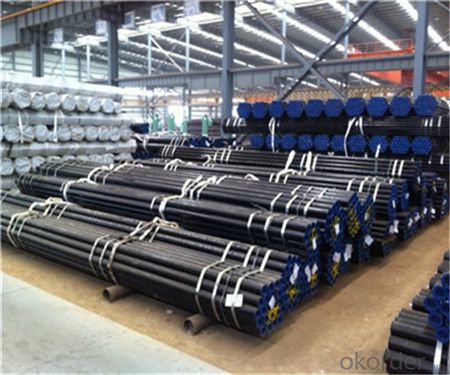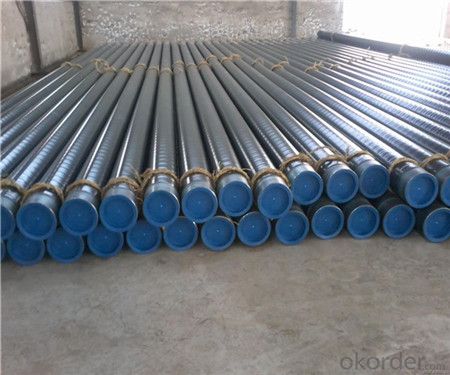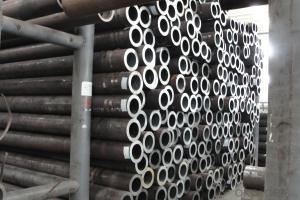Seamless Pipe Raw Pipe
- Loading Port:
- China Main Port
- Payment Terms:
- TT or LC
- Min Order Qty:
- -
- Supply Capability:
- -
OKorder Service Pledge
OKorder Financial Service
You Might Also Like
1、Structure of Seamless Pipe :
Seamless pipe was regarded as withstanding pressure better than other types, and was often more easily available than welded pipe.
2、Main Features of the Seamless Pipe :
• High manufacturing accuracy
• High strength
• Small inertia resistance
• Strong heat dissipation ability
• Good visual effect
• Reasonable price
3、Seamless Pipe Specification:
Standard | GB, DIN, ASTM ASTM A106-2006, ASTM A53-2007 |
Grade | 10#-45#, 16Mn 10#, 20#, 45#, 16Mn |
Thickness | 8 - 33 mm |
Section Shape | Round |
Outer Diameter | 133 - 219 mm |
Place of Origin | Shandong, China (Mainland) |
Secondary Or Not | Non-secondary |
Application | Hydraulic Pipe |
Technique | Cold Drawn |
Certification | API |
Surface Treatment | factory state or painted black |
Special Pipe | API Pipe |
Alloy Or Not | Non-alloy |
Length | 5-12M |
Outer Diameter | 21.3-610mm |
Grade | 20#, 45#, Q345, API J55, API K55, API L80, API N80, API P110, A53B |
Standard | ASME, ASTM |
1) Material:20#(ASTM A 106/A53 GRB.API5LGRB,GB),45#,16Mn,10#.
2) Specification range:OD:21.3-610mm,WT:6-70mm,length:6-12m or according to the requirement of clients.
3) Excutive standards:GB,ASME API5L.ASTM A 106/A53,Despite of the above standards,we can also supply seamless steel pipe with standard of DIN,JIS,and so on,and also develop new products according to the requirements of our clients!
4) Packing:bundles wrapped with strong steel strip,seaworthy packing.
4、Packaging & Delivery
Packaging Details: | seaworthy package,bundles wrapped with strong steel strip |
Delivery Detail: | 15-30days after received 30%TT |
5、FAQ of Seamless Pipe :
①How is the quality of your products?
Our products are manufactured strictly according to national and internaional standard, and we take a test on every pipe before delivered out. If you want see our quality certifications and all kinds of testing report, please just ask us for it.
②How about price?
We are able to give you lowest price below market one, and we have a policy that “ for saving time and absolutely honest business attitude, we quote as lowest as possible for any customer, and discount can be given according to quantity”.Please trust the quotation we would give you, it is professional one.
③Why should you chose us?
Chose happens because of quality, then price, We can give you both.Additionally, we can also offer professional products inquiry, products knowledge train(for agents), smooth goods delivery, exellent customer solution proposals.Our service formula: good quality+good price+good service=customer’s trust
SGS test is available, customer inspection before shipping is welcome, third party inspection is no problem.
Any question, pls feel free to contact us !
6、Seamless Pipe Images:


- Q:What is the difference between steel pipes and PVC-U pipes?
- Steel pipes and PVC-U pipes differ in their composition, durability, and application. Steel pipes are made from iron and carbon, providing them with high strength and resistance to extreme conditions. They are commonly used for transporting water, gas, and oil in industrial settings due to their durability and ability to withstand high pressure and temperature. PVC-U pipes, on the other hand, are made from a synthetic plastic called polyvinyl chloride. They are lightweight, corrosion-resistant, and easy to install, making them ideal for residential plumbing, irrigation systems, and drainage. While steel pipes are more robust and suitable for heavy-duty applications, PVC-U pipes are cost-effective, versatile, and suitable for lighter applications.
- Q:Can steel pipes be used for underground oil pipelines?
- Indeed, underground oil pipelines can utilize steel pipes. The construction of underground oil pipelines heavily relies on steel pipes owing to their robustness, longevity, and resistance to corrosion. They possess the capability to endure the immense pressure and weight exerted by the oil being transported, along with external forces like soil displacement or seismic events. Moreover, steel pipes can be fortified with coatings or linings such as epoxy or polyethylene, enhancing their resistance to corrosion and extending their lifespan. In conclusion, steel pipes emerge as a dependable and extensively employed option for underground oil pipelines.
- Q:How are steel pipes used in the manufacturing of structural frameworks?
- Steel pipes are commonly used in the manufacturing of structural frameworks due to their strength, durability, and versatility. They provide a reliable means of connecting and supporting various components, allowing for the creation of robust and stable structures. Steel pipes are often used as columns, beams, and braces, providing essential support and stability to buildings, bridges, and other infrastructure projects. Additionally, steel pipes can be easily customized and fabricated to meet specific design requirements, making them a popular choice in the construction industry.
- Q:Can steel pipes be used for transporting hazardous materials?
- Yes, steel pipes can be used for transporting hazardous materials. Steel pipes are known for their strength, durability, and resistance to corrosion, making them suitable for handling various types of hazardous substances. Additionally, steel pipes can be designed to meet specific requirements, such as pressure ratings and chemical compatibility, ensuring the safe transport of hazardous materials. However, it is crucial to consider additional safety measures and comply with relevant regulations to minimize any potential risks associated with transporting hazardous materials.
- Q:What are the common grades of steel used in pipes?
- The common grades of steel used in pipes include carbon steel, stainless steel, and alloy steel.
- Q:How are steel pipes classified based on pressure ratings?
- Steel pipes are classified based on pressure ratings by assigning them different schedules, ranging from Schedule 10 to Schedule 160. Each schedule represents a different maximum pressure that the pipe can withstand, with higher schedules indicating higher pressure ratings.
- Q:Are steel pipes suitable for use in mining applications?
- Yes, steel pipes are highly suitable for use in mining applications. Steel pipes offer excellent durability, strength, and resistance to corrosion, making them ideal for transporting various materials, such as water, gases, and minerals, in mining operations. Additionally, steel pipes can withstand high pressure and extreme temperatures, ensuring their reliability and longevity in demanding mining environments.
- Q:What are the safety measures to be followed while working with steel pipes?
- There are several safety measures that should be followed while working with steel pipes. Firstly, it is important to wear appropriate personal protective equipment (PPE) such as safety glasses, gloves, and steel-toed boots to protect against potential hazards. Secondly, workers should be cautious of sharp edges or burrs on the pipes and handle them with care to avoid cuts or injuries. Additionally, proper lifting techniques should be employed when moving heavy steel pipes to prevent strains or back injuries. It is also crucial to secure pipes properly during transport or storage to prevent accidents. Finally, workers should be trained on the safe use of tools and equipment associated with steel pipe work to minimize the risk of accidents or damage.
- Q:How seamless steel tube is formed?
- Overview of two kinds of steel pipe process:1, cold drawing (rolling) seamless steel pipe: round tube to heating to perforation, annealing, pickling, leading to oil (copper), multi pass drawing (Leng Zha), the blank pipe, heat treatment, straightening, pressure test (testing), marking and warehousing.2. Hot rolling (extrusion seamless steel tube): round tube billet, heating, piercing, three roll cross rolling, rolling or extrusion, removal of pipe, sizing, reducing (diameter or reducing), cooling, blank tube, straightening, water pressure test (or flaw detection), marking and warehousing.
- Q:What is the difference between steel pipes and concrete pipes?
- Steel pipes and concrete pipes differ in terms of their material composition and physical characteristics. Steel pipes are made from steel alloys, which make them strong, durable, and resistant to corrosion. They have high tensile strength, allowing them to withstand high-pressure applications. Steel pipes are commonly used in industries such as oil and gas, plumbing, and construction. On the other hand, concrete pipes are made from a mixture of cement, aggregates, and water. They are known for their exceptional compressive strength and durability. Concrete pipes are commonly used in sewage systems, drainage systems, and culverts. In terms of installation, steel pipes are lightweight and easy to handle, making them more convenient to transport and install. Concrete pipes, on the other hand, are heavier and require specialized equipment for installation. Additionally, steel pipes have a smooth internal surface, which allows for efficient flow of fluids or gases. Concrete pipes, however, have a rougher internal surface, which may cause more friction and result in reduced flow rates. Overall, the choice between steel pipes and concrete pipes depends on the specific requirements of the project, including factors such as application, budget, and durability needs.
1. Manufacturer Overview |
|
|---|---|
| Location | |
| Year Established | |
| Annual Output Value | |
| Main Markets | |
| Company Certifications | |
2. Manufacturer Certificates |
|
|---|---|
| a) Certification Name | |
| Range | |
| Reference | |
| Validity Period | |
3. Manufacturer Capability |
|
|---|---|
| a)Trade Capacity | |
| Nearest Port | |
| Export Percentage | |
| No.of Employees in Trade Department | |
| Language Spoken: | |
| b)Factory Information | |
| Factory Size: | |
| No. of Production Lines | |
| Contract Manufacturing | |
| Product Price Range | |
Send your message to us
Seamless Pipe Raw Pipe
- Loading Port:
- China Main Port
- Payment Terms:
- TT or LC
- Min Order Qty:
- -
- Supply Capability:
- -
OKorder Service Pledge
OKorder Financial Service
Similar products
New products
Hot products
Related keywords































